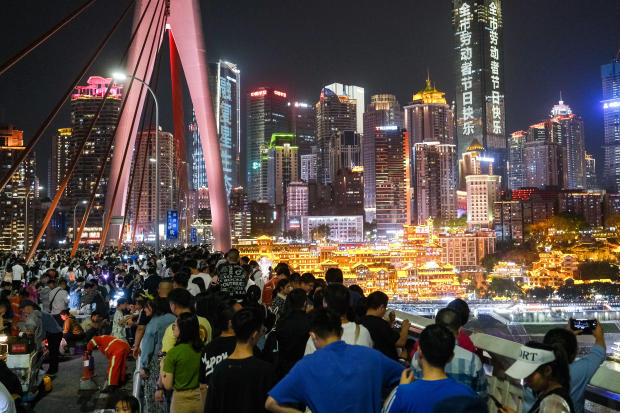China public holidays bring a post-COVID travel boom, and a boost for its shaky economic recovery
Tokyo — Something unimaginable just one year ago is happening in China. With coronavirus lockdowns and travel restrictions behind them, hundreds of millions of Chinese are flocking to tourist attractions around the country.
Centered around the May Day public holiday on the first of the month, China's spring break lasts five days, starting on April 29. The China Tourism Academy predicted that more than 240 million passenger trips would be made during the five-day period this year, beating even pre-pandemic figures.
- COVID surge casts shadow over China's Lunar New Year travel rush
On the first day, travel surged 151.8% compared to the same day last year, with tickets to popular sites including the Badaling section of the Great Wall, near the Chinese capital, and Shanghai Disney all sold out. Both of Beijing's airports saw record numbers of flyers on Saturday.

Hotspots and resorts that looked like ghost towns only a few months ago have come fully back to life, with some even forced to post online notices warning holidaymakers to look elsewhere as they'd reached capacity.
China's tourism industry has not missed the chance to cash in. Official media reported that a resort town in southwest China was charging rates 16-times higher than its normal fees on April 30 as demand soared. Flights prices are also up an estimated 39% from 2019, before COVID struck and locked the country down.
- China lashes out at WHO, defends its search for COVID origin
It's a much-needed windfall for an increasingly important sector of China's mammoth economy. Three of China's largest airlines collectively lost almost $3 billion during the three years of travel restrictions, according to a Chinese financial news outlet.
The Chinese economy's recovery from COVID has been shaky, so the boost from tourism will be more than welcome both by industry, and government. New data have shown an unexpected decrease in factory activity last month amid weaker global demand for China's exported goods.
But China's ministry of commerce has said major retail and food service companies saw 21% sales growth on the first day of the "golden week" holiday compared to the previous year. Many are thanking a trend of what's been dubbed "revenge spending," as people with repressed retail and travel cravings have tried to catch up since the stringent "Zero-COVID" policy was abandoned last winter.
The Chinese crowds are not flocking to overseas destinations yet, however. Only 10% of Chinese travelers have international trips booked this year, according to new data. While domestic travel has bounced back to pre-COVID levels, the number of international flights departing China is still only about an eighth of the figures from 2019.
The study points to lingering safety concerns among Chinese travelers to explain that lag, rather than cost or availability.
- In:
- Travel
- Coronavirus Disease 2019
- Economy
- COVID-19
- COVID-19 Pandemic
- Disney World
- lockdown
- China
- Beijing
- Airlines
Disclaimer: The copyright of this article belongs to the original author. Reposting this article is solely for the purpose of information dissemination and does not constitute any investment advice. If there is any infringement, please contact us immediately. We will make corrections or deletions as necessary. Thank you.







